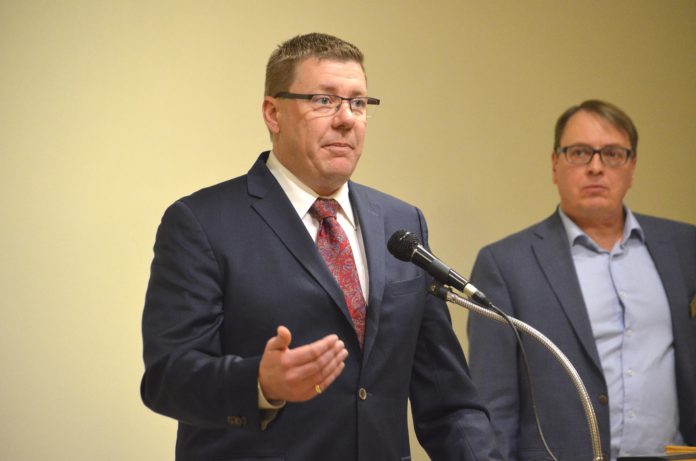
Premier Scott Moe is telling everyone he can about Saskatchewan’s trade prowess while touting the benefits of free trade as US President Donald Trump mulls more tariffs on Canadian exports.
Moe touched on trade as a topic of discussion during a breakfast hosted by the Prince Albert and District Chamber of Commerce Monday.
As a producing economy, Moe said, Saskatchewan exports dozens of products to the United States and other nations, products that rely on free trade agreements to make their way to markets. Just under two weeks ago, Moe made the trip to Washington to meet with senators, house representatives and four members of Trump’s administration.
“I had the opportunity o make the case that both the united States and Canada have benefited mightily from the North American Free Trade Agreement, and protectionism in any way, steel, milk, or any other way, is self-defeating for both of our countries,” he said.
“It’s a true honour to represent you and deliver that Saskatchewan pitch wherever I go.”
Moe said the province’s exports have risen by 46 per cent over the past decade, and agriculture exports have doubled over that same period of time.
“This is truly an incredible story,” he said.
The premier talked of Saskatchewan’s exports of peas, lentils, chickpeas, wheat, barley and oats. He spoke of canola, a Saskatchewan invention, which is now the province’s top export with over $3 billion in exports last year. He mentioned farm machinery, food and forestry products and energy exports. Overall, Moe said, “Saskatchewan is a mighty exporter, not just in Canada, but on a per capita basis, we are one of the largest … exporters in the world.
“We’re not only traders by inclination, we’re traders by necessity.”
When it comes to oil, according to the premier, Saskatchewan sends more to the US than Kuwait, Nigeria or the United Arab Emirates.
“This is what we do in Saskatchewan, he said.
“This is the source of our wealth. As we continue to add value to these exports, we continue to increase that wealth. We benefit, Canada benefits and the world benefits.”
Trump has ceased exempting Canada from steel tariffs, and has mulled other tariffs after apparently becoming angered by Prime Minister Justin Trudeau’s assertion that Canada “will not be pushed around.”
Those steel tariffs, Moe said, are actually working against the president, delaying approved pipelines because the Canadian steel, including that produced by Evraz in Regina, has suddenly been hit with a 25 per cent tariff.
The decision has led to widespread condemnation in Canada and in the US. The House of Commons recently passed a unanimous motion condemning Trump’s tariffs and his insults aimed at Canada’s PM.
Other unexpected allies, such as newly-elected Ontario premier Doug Ford, have also said they stand in solidarity with the federal government. The federal Liberals have also announced a package of retaliatory tariffs that would go ahead July 1 if no agreement can be reached in the interim.
Responding to local media Monday, Moe said he also stands with the federal government in the trade dispute.
“The North American Free Trade Agreement is very important not just for Saskatchewan but the Nation of Canada. Eighty-five per cent of the product we import into our product comes from the United States. Fifty-five percent of the product that we export out of Saskatchewan goes to the United States,” he said.
‘All of our trade agreements are important, but in particular (NAFTA) is important. We encourage our Prime Minister to ensure that he’s representing Canadians and people from this province, but to also ensure that he is engaging with all hands on deck.”
Moe, though, urged calm from all sides as the dispute gets more tense.
“I think it would do us all good stead to take a step back and remember 25 years ago at the inception of a free trade agreement, he said.
“Those were very sensitive and challenging discussions as well. It’s no different today as we modernize that agreement.”

